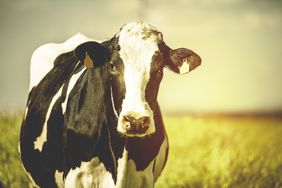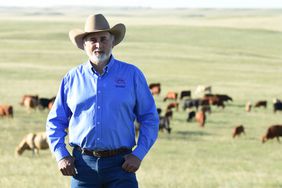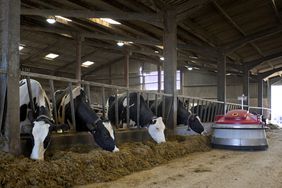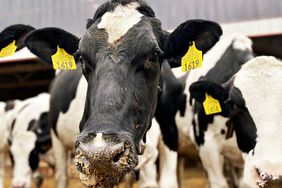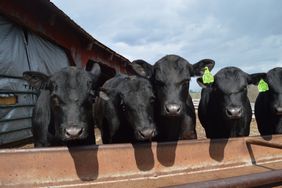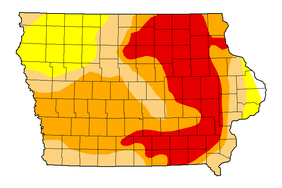:max_bytes(150000):strip_icc()/DSC_01672028129-2000-9fd438f01aae4576987cd1ab4186051a.jpg)
If farmers don't change how they treat parasites in their cow herds, they could put the effectiveness of dewormers and their cattle health at risk.
- For many herds, deworming has been a wash-and-repeat practice — apply in the spring and again in the fall for optimal pasture management. Unfortunately, this has led farmers to think they have eliminated every worm in their cows, says Wayne Ayers, a senior veterinarian of cattle technical services with Elanco.
"We need to get away from what we have been doing for years and thinking the solution will come from a syringe, and that we can get rid of them permanently because that is getting us in trouble by creating resistance to the chemicals we are using," Ayers says.
Currently, no new dewormers are on the market, and research shows that within 10 years, gastrointestinal parasites in some beef herds begin to develop resistance to certain chemicals, which means that parasites are slowly getting ahead of farmers.
Gastrointestinal parasites, such as the brown stomach worm, are the most damaging of worms, especially with calves, because they can cause cattle to become anorexic. Symptoms of worms in cattle include reduced feed intake, weaning weights, and decrease a calf's weight gain, which also delays a calf's puberty.
However, the cow's immune system has the most extensive damage, says Jacques Fuselier, veterinarian technical services manager with Merck Animal Health.
"If a cow's immune system is preoccupied trying to fight the parasite, then her natural function for defense against any other disease is going to be limited," he says. "So, many functions like reproduction have been damaged, making it hard for a cow to return from its fight with the worm."
How farmers can fight resistance
Farmers may get better control of gastrointestinal parasites out on pasture with a more holistic approach, species-specific quantitative analysis, which uses three tests to learn the parasite species and quantity of parasites in your herd.
"We need to manage the parasites so that the cow can live physiologically with them and we, producers, can live with them economically. There is a point where this is achievable," Ayers says.
The species-specific quantitative analysis recommends farmers conduct a fecal egg count composite, a coproculture, a manure sample where parasite eggs are hatched in a lab and a fecal egg count reduction to better understand the parasite species present.
Ayers says the fecal egg count, samples from about 20 animals, will give farmers a relative understanding of the parasite load on their pastures, but not the species. That's where the coproculture comes in; it tells the farmers the parasite species or worms live with their cows. Using that knowledge, farmers can apply the right kind of dewormer to treat their cow herd, Ayers adds.
Farmers can use knowledge gained to better practice refugia, the practice of leaving some sensitive parasites on pasture to reduce the risk of resistance. Some research recommends not deworming 10-20% of mature animals.
"We don't want to treat all the cows, just treat certain cows and let some of those cows deposit eggs out there that will remain sensitive to the chemical in the dewormer we are using," he says.
Treating only some cows is also economical, especially if the deworming product is expensive. It can be a greater return on investment to treat youngstock, such as calves, which are more susceptible to worms.
"What I want is a cow out on pasture shedding organisms that I can treat her calf for because that is where my biggest economic loss will be," Ayers says.
After 14 days post-deworming, farmers can take a fecal egg reduction test, about 20 manure samples from their pastures, to send to a lab to ensure their deworming product is effective. Merck offers fecal-reduction count kits free of charge and will send a report to help farmers get a snapshot of the effectiveness of their dewormer, adds Fuselier.
"There should be a 90% or greater reduction in the parasite egg count. If it's less than 90%, it could mean your dewormer isn't working or that you didn't give an effective dose, but it also means putting a call in to your veterinarian and asking them to help you come up with a new plan," Fuselier says.
Ayers says that Refugia is a different way of thinking, but farmers need to get used to wanting worms on their pastures.
"Right now, it looks like we are winning the war, but it's more the battle. The war is in the parasite's favor," says Ayers.
When it comes to fighting the war of resistance with parasites, farmers should have the attitude of, "I want the right kind of worms on my pasture," he says.
